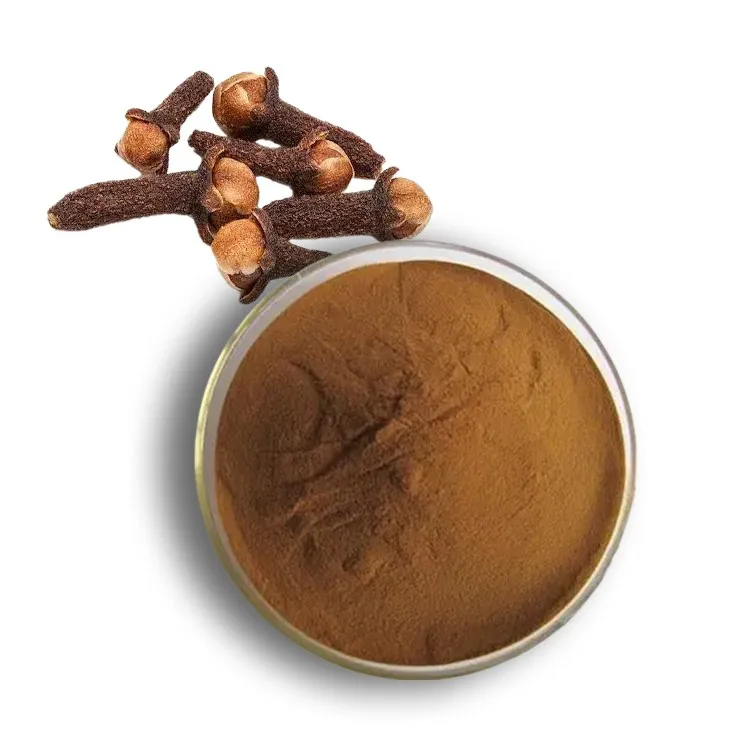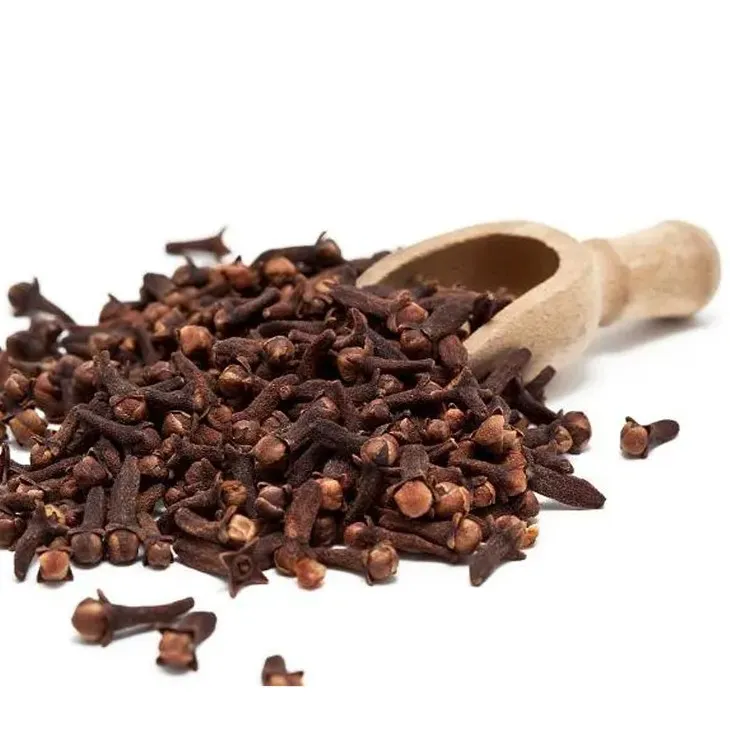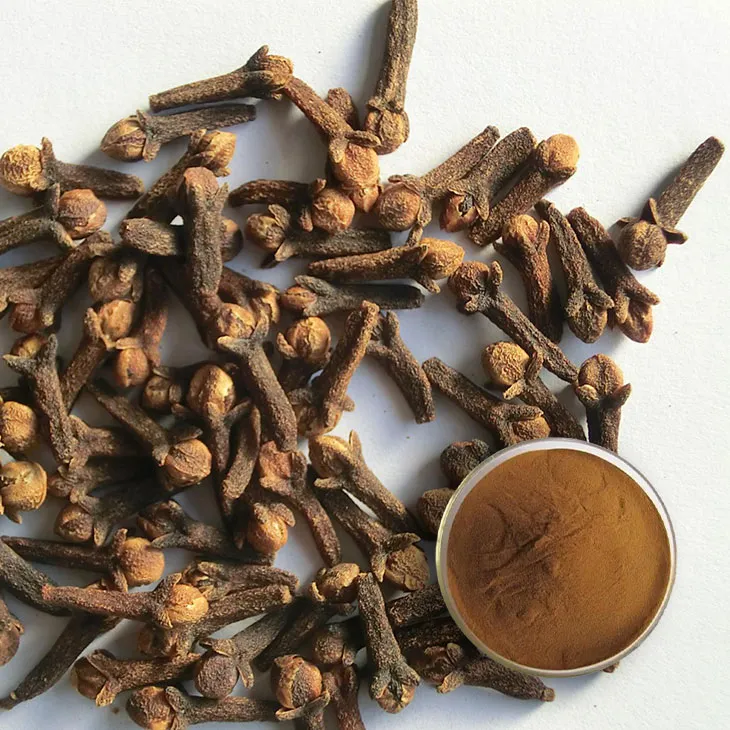- 0086-571-85302990
- sales@greenskybio.com
Best Answers to 7 Key Questions about Clove Powder.
2024-12-17

1. What is Clove Powder?
Clove Powder is a fine, powdered form of cloves. Cloves are the dried flower buds of the Syzygium aromaticum tree, which is native to the Maluku Islands in Indonesia. These small, dark brown buds are highly aromatic and have a strong, pungent flavor. When ground into a powder, they become a versatile ingredient that can be used in various applications.

2. Where does Clove Powder Originate?
As mentioned, cloves are native to the Maluku Islands, also known as the Spice Islands. Historically, the trade of cloves was a highly lucrative business. Arab traders were among the first to introduce cloves to the rest of the world. From there, the cultivation of cloves spread to other tropical regions such as Madagascar, Zanzibar, and India. Today, Indonesia still remains one of the largest producers of cloves and, consequently, clove powder.

3. How is Clove Powder Made?
The process of making clove powder involves several steps:
- Harvesting: Cloves are harvested when the flower buds are still in their immature stage. This is typically when they are a deep red color and about 1.5 - 2 centimeters long.
- Drying: After harvesting, the cloves are carefully dried. This can be done either in the sun or in a well - ventilated drying facility. Drying helps to preserve the cloves and intensifies their flavor.
- Grinding: Once the cloves are fully dried, they are ground into a fine powder. This can be done using a traditional mortar and pestle for small - scale production or with the use of industrial grinding machines for larger quantities.

4. What are the Culinary Uses of Clove Powder?
Clove powder has a wide range of culinary uses:
- Baking: It is a common ingredient in baked goods such as cakes, cookies, and bread. In baking, clove powder adds a warm, spicy flavor. For example, in a traditional gingerbread recipe, clove powder is one of the key spices that gives the characteristic flavor.
- Meat and Poultry: Clove powder can be used to season meat and poultry. It helps to enhance the flavor and also has antimicrobial properties that can help in preserving the meat. When making a spiced roast chicken, a sprinkle of clove powder along with other spices can create a delicious and aromatic dish.
- Pickling: In pickling, clove powder is often used. It adds flavor to pickled vegetables and fruits. For instance, in pickled cucumbers, the addition of clove powder gives a unique and spicy taste.
- Hot Beverages: Clove powder can be added to hot beverages like tea and mulled wine. In a cup of chai tea, a pinch of clove powder along with cardamom, cinnamon, and other spices creates a rich and fragrant drink. In mulled wine, it adds warmth and depth of flavor.
5. What are the Medicinal Properties of Clove Powder?
Clove powder has several medicinal properties:
- Antimicrobial: Clove powder contains compounds such as eugenol, which has antimicrobial properties. This means it can help in fighting against bacteria, fungi, and viruses. For example, it can be used as a natural remedy for oral health problems. Gargling with a solution containing clove powder can help in reducing the growth of bacteria in the mouth and relieve toothache.
- Anti - Inflammatory: It also has anti - inflammatory properties. This can be beneficial for conditions such as arthritis. Consuming clove powder in moderation may help in reducing inflammation in the body.
- Digestive Aid: Clove powder can stimulate the digestive system. It helps in increasing the production of digestive enzymes, which in turn can improve digestion. It can be used to relieve symptoms such as bloating and indigestion.
- Respiratory Health: In traditional medicine, clove powder has been used to treat respiratory problems. It can help in relieving coughs and congestion. For example, inhaling the steam of a clove - powder - infused water can soothe the airways.
6. How to Store Clove Powder?
To store clove powder properly:
- Use an Airtight Container: Store the clove powder in an airtight container. This helps to prevent air from coming into contact with the powder, which can cause it to lose its flavor and aroma over time.
- Keep in a Cool, Dark Place: Clove powder should be stored in a cool, dark place. Exposure to heat and light can degrade the quality of the powder. A pantry or a cupboard away from direct sunlight and heat sources is an ideal location.
- Avoid Moisture: Moisture can cause clove powder to clump together and may also lead to the growth of mold. Make sure the container is dry before storing the powder, and if possible, add a desiccant packet to absorb any excess moisture.
7. Are There any Precautions When Using Clove Powder?
While clove powder has many benefits, there are some precautions to keep in mind:
- Allergic Reactions: Some people may be allergic to cloves. Allergic reactions can range from mild symptoms such as skin rashes and itching to more severe reactions like difficulty in breathing. If you are using clove powder for the first time, it is advisable to do a patch test.
- Dosage: When using clove powder for medicinal purposes, it is important to follow the proper dosage. Excessive consumption of clove powder can lead to side effects such as nausea, vomiting, and diarrhea. It is best to consult a healthcare professional before using it for medicinal treatments.
- Pregnancy and Breastfeeding: Pregnant and breastfeeding women should be cautious when using clove powder. There is limited research on its safety during these periods, so it is advisable to avoid or use it under the guidance of a doctor.
FAQ:
What is the origin of clove powder?
Clove powder is made from cloves. Cloves are the dried flower buds of the clove tree, which is native to Indonesia. They have been cultivated for centuries in various tropical regions around the world, such as Madagascar, Zanzibar, and Sri Lanka. The cloves are harvested, dried, and then ground into powder form.
How is clove powder used in cooking?
Clove powder is a versatile spice in cooking. It adds a warm, sweet, and slightly spicy flavor. It can be used in baking, for example, in gingerbread cookies, fruitcakes, and pies. In savory cooking, it is often used in spice blends for marinades, especially for meats like ham. It also pairs well with other spices such as cinnamon and nutmeg in mulled wines or warm winter beverages.
What are the medicinal properties of clove powder?
Clove powder has several potential medicinal properties. It contains eugenol, which has antimicrobial properties and may help fight against certain bacteria and fungi. It has been used traditionally to relieve toothache as it has a numbing effect. Clove powder may also aid in digestion by stimulating the production of digestive enzymes. Additionally, it has antioxidant properties that can help protect the body's cells from damage.
Is clove powder safe for everyone to use?
While clove powder has many benefits, it may not be safe for everyone. In large amounts, it can cause irritation to the digestive system. People with bleeding disorders should be cautious as clove powder may increase the risk of bleeding. Also, pregnant women should avoid consuming large amounts of clove powder as it may potentially harm the fetus. However, when used in normal culinary amounts, it is generally considered safe for most people.
How should clove powder be stored?
Clove powder should be stored in a cool, dry place, away from direct sunlight. An airtight container is ideal to prevent moisture from getting in, which can cause the powder to clump or spoil. If stored properly, it can retain its flavor and potency for a long time.
Related literature
- The Comprehensive Guide to Clove Powder: Properties and Applications"
- "Clove Powder: Unraveling its Mysterious Health Benefits"
- "Cooking with Clove Powder: Tips and Tricks"
- ▶ Hesperidin
- ▶ Citrus Bioflavonoids
- ▶ Plant Extract
- ▶ lycopene
- ▶ Diosmin
- ▶ Grape seed extract
- ▶ Sea buckthorn Juice Powder
- ▶ Fruit Juice Powder
- ▶ Hops Extract
- ▶ Artichoke Extract
- ▶ Mushroom extract
- ▶ Astaxanthin
- ▶ Green Tea Extract
- ▶ Curcumin
- ▶ Horse Chestnut Extract
- ▶ Other Product
- ▶ Boswellia Serrata Extract
- ▶ Resveratrol
- ▶ Marigold Extract
- ▶ Grape Leaf Extract
- ▶ New Product
- ▶ Aminolevulinic acid
- ▶ Cranberry Extract
- ▶ Red Yeast Rice
- ▶ Red Wine Extract
-
Gynostemma pentaphyllum extract
2024-12-17
-
Sophora Japonica Flower Extract
2024-12-17
-
Andrographis Paniculata Extract Powder
2024-12-17
-
Pine bark Extract Powder
2024-12-17
-
Senna Leaf Extract
2024-12-17
-
Citrus bioflavonoids
2024-12-17
-
Agaricus Blazei Extract
2024-12-17
-
Epimedium extract powder
2024-12-17
-
Alfalfa Meal
2024-12-17
-
White Peony Extract
2024-12-17





















